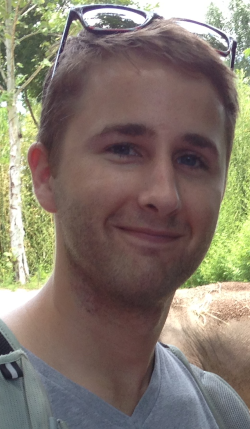ENHS practicum student facilitates major change in methods for determining seafood safety
December 3, 2014 edited December 15, 2014

MPH candidate James Evans will complete his ENHS practicum at ISSC and graduate in December
South Carolina is famous for its oyster roasts and Lowcountry boils. What is less well known is the fact that U.S. seafood safety regulations for molluscan shellfish—any type of edible mollusk, such as oysters, mussels and scallops—are hashed out right here in Columbia at the Interstate Shellfish Sanitation Conference. James Evans, a graduate student in the Arnold School of Public Health, helped research potential new tools for updating regulations during his practicum—a practice-based project in the public health field for academic credit.
The shellfish sanitation conference was formed in 1982 to foster and promote shellfish sanitation through the cooperation of state and federal agencies, the shellfish industry and the academic community. The organization establishes federal regulations for the safe harvesting, processing and shipping of molluscan shellfish in the U.S.
The conference manages the National Shellfish Sanitation Program, which requires governing agencies to use up-to-date research in deciding how long a shellfish bed has to remain closed following contamination, such as a sewage spill. But many factors can affect the how long the shellfish beds are unsafe for harvesting and the conference decided more research was needed to provide better guidance.
Through his practicum, James helped evaluate a new microbial indicator, called male specific coliphages, to assess the safety of shellfish and shellfish growing waters.
“I wanted to see the relationship between policy and scientific research, particularly infectious diseases,” James says. “This opportunity was the perfect fit.”
James worked with the shellfish sanitation conference to survey an expert panel about the use of this particular indicator, first discussed in 2005, for shellfish regulation. James summarized the findings into an expert report for the conference. It was the first time the conference had used such a panel for its deliberations, the organization’s executive director Ken Moore says.
During his practicum, James experienced the front lines of the seafood safety regulatory environment, working with federal and state regulators, shellfish industry members and researchers at academic institutions, such as the Bloomberg School of Public Health at Johns Hopkins and the European Union Research Laboratory for bacterial and viral contamination of bivalve molluscs.
“We really appreciate our interactions with the Arnold School of Public Health through James’ practicum project, and we look forward to future collaborations,” Moore says.
James graduates in December and plans to move to the Charleston area and pursue a career with an organization that studies infectious diseases associated with marine environments and creates intervention strategies to reduce these infections. “As coastal populations in the U.S. continue to increase, marine pathogens will need proper monitoring and attention,” James says.
Learn more
Visit the Interstate Shellfish Sanitation Conference website for more information about that organization. Visit MySPH for more information about practice-based opportunities or to search the MySPH Opportunity Manager for a practicum or residency position.



_01.jpg)
_02.jpg)